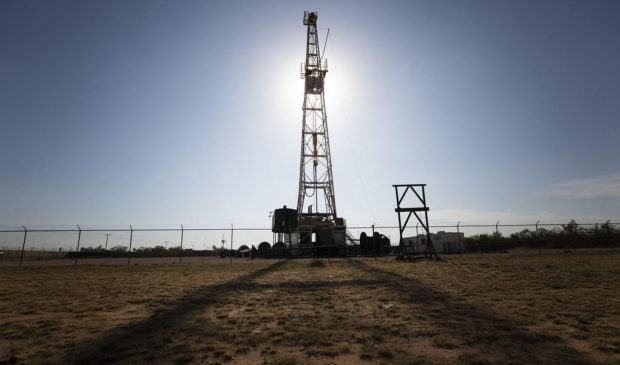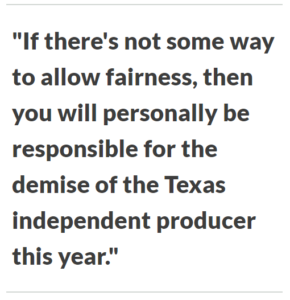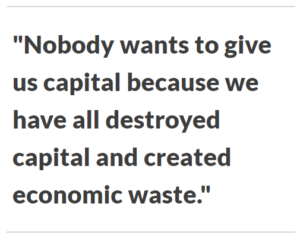Newsletter Signup
The Austin Monitor thanks its sponsors. Become one.
Most Popular Stories
- Parks Board recommends vendor for Zilker Café, while voicing concerns about lack of local presence
- City leaders evaluate surprising ideas for water conservation
- Audit: Economic official granted arts, music funding against city code
- Downtown Historic Resource Survey eyes seven new districts eligible for designation
- Austin is losing even more water to leaky city pipes than previously thought
-
Discover News By District
Popular Whispers
Sorry. No data so far.

Photo by Gabriel C. Pérez/KUT
Amid historic oil bust, Texas regulators consider the once unthinkable: Keeping it in the ground
Wednesday, April 15, 2020 by Mose Buchele, KUT
In a move that would have been unimaginable just a couple of months ago, Texas is considering limiting oil production in the state. Capping the amount of crude that can be pumped is a power the state has not used in nearly 50 years. But at a meeting Tuesday, regulators heard it may be needed to stabilize an industry in freefall.
The Railroad Commission of Texas is the state agency that regulates oil and gas. In the 1930s, when cheap domestic crude flooded the market, the commission was granted the power to boost prices by curbing production, but it has not used the tool – called proration – since 1973.
In recent decades, as industry decried government regulation and strict free-market ideology became the norm among Texas politicians, the notion that prorationing would ever be used again seemed unlikely.
That changed when oil prices cratered due to a historic drop in demand brought by Covid-19 and a flood of cheap oil from foreign competitors. Fearing an extended period of rock-bottom crude prices, some oil companies went to commissioners, asking them to consider enforcing production limits.
An Industry Divided
The industry is deeply divided over the idea. Much of where a company stands depends on how well-positioned it is to weather the current oil bust.
Larger, vertically integrated companies that have assets to survive the downturn, the ability to store massive reserves of oil and guaranteed space to move oil in pipelines generally oppose prorationing.

“They’re probably looking at this downturn as a buying opportunity,” Owen Anderson, a professor of oil and gas law at UT Austin, said. “Because, of course, they have some capital assets to devote to buying up companies and properties – probably for bargain-basement prices.”
Smaller independent oil producers operating in Texas’ shale regions are more likely to support the plan. They are at greatest risk in the downturn and view prorationing as a way for all companies to share the pain of production cuts until the industry picks back up.
“The bigger guys have plenty of market, plenty of pipeline access and plenty of ways to store their oil; independents do not,” Kirk Edwards, head of Latigo Petroleum, told the commission. “If there’s not some way to allow fairness, then you will personally be responsible for the demise of the Texas independent producer this year.”
What Is a Free Market?
The debate over prorationing was often framed in terms of free-market principles, with different voices offering wildly different perspectives on the state of the industry.
“Texans fundamentally believe that the government should not be in the business of picking winners and losers,” said Todd Staples, head of the Texas Oil and Gas Association, a group that opposes proration.

But Scott Sheffield with Pioneer Natural Resources echoed others when he suggested the notion of a free market in the oil and gas industry has always been a myth.
“After 35 years as a CEO, I’ve never seen a free market,” he said. “Many of the companies speaking after me are asking for government debt bailouts, tariffs, carbon tax credits – is that a free market? Those companies could care less about the small or medium producers.”
Some advocates of production limits suggested Texas should embrace prorationing as a tool even after the downturn has passed to soften the boom-bust cycle.
“As an ex-reservoir engineer, I’d rather have stable prices … that (are) prorated than what I have lived with my entire career,” Sheffield said. “It has been an economic disaster.”
“Nobody wants to give us capital because we have all destroyed capital and created economic waste,” he added.
Environment Enters the Picture
The debate has also led to an unusual alliance between some oil companies and environmental groups that see prorationing as an opportunity to tackle the long-standing problem of flaring.
Flaring is the practice of burning off natural gas that comes from the ground in the process of producing oil. It destroys air quality and contributes to climate change. At the hearing, environmental groups argued oil companies that flare the most should cut production from wells that flare.
The proposal was co-signed by some oil companies at the hearing.
“It will be a home run for the three Texas Railroad commissioners: You can cut oil; you can also reduce CO2 emissions,” Sheffield said.
Part of an International Deal
The debate in Texas is playing out while international efforts to curb production move ahead.
Earlier this week, President Donald Trump brokered a deal between OPEC and other oil-producing countries to cut production by around 10 million barrels a day in an attempt to stabilize prices.
As part of that deal, Trump agreed the U.S. would also decrease production. But the president has no authority to mandate oil curtailment and gave no clear explanation of how he could guarantee the promised cuts.
At the Railroad Commission, advocates of prorationing agreed a decrease in oil production in Texas would not influence prices unless done in cooperation with other oil-producing countries. But they said it could become a tool as part of those larger international efforts.
“The Railroad Commission of Texas has the power to limit oil production, but the president does not,” Commission Chair Wayne Christian said. “That’s kind of a sobering responsibility we find ourselves holding today.”
This story was produced as part of the Austin Monitor’s reporting partnership with KUT.
The Austin Monitor’s work is made possible by donations from the community. Though our reporting covers donors from time to time, we are careful to keep business and editorial efforts separate while maintaining transparency. A complete list of donors is available here, and our code of ethics is explained here.
You're a community leader
And we’re honored you look to us for serious, in-depth news. You know a strong community needs local and dedicated watchdog reporting. We’re here for you and that won’t change. Now will you take the powerful next step and support our nonprofit news organization?


